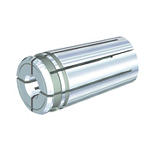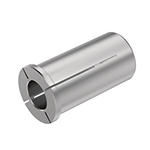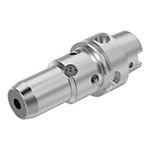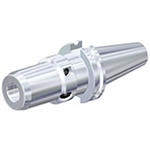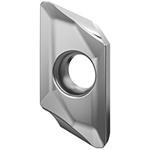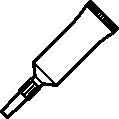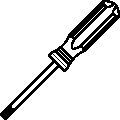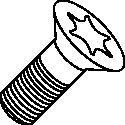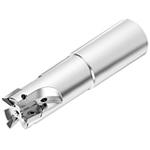Produit similaire à:
5720 Series • End Mill • Cylindrical Shank • Inch
Shoulder milling cutter for high-speed aluminum machining.
Numéro de matériel5672718
Ref. ISO CatalogueC5720VZ16CA1.0Z2R2.75Ref. ANSI CatalogueC5720VZ16CA1.0Z02R2.7
- K Fonte
- N Non ferreux
Spiral Circular
Slotting: Shoulder Profiling
Surfaçage
Fraisage hélicoïdal
Ramping : Ébauche
Queue — Cylindrique Classique
Fraisage — Arrosage interne
Usinage de poches
Lamage
Inclined Square End Mill
Sending to {{cadTool}} in progress...
Downloaded file will be available after import in the {{cadTool}} tool library.
- Aperçu
- Données d'application
- Téléchargements
- Pièces compatibles côté machine
- Pièces compatibles côté pièce
- Pièces de rechange
- Révision
- FAQ
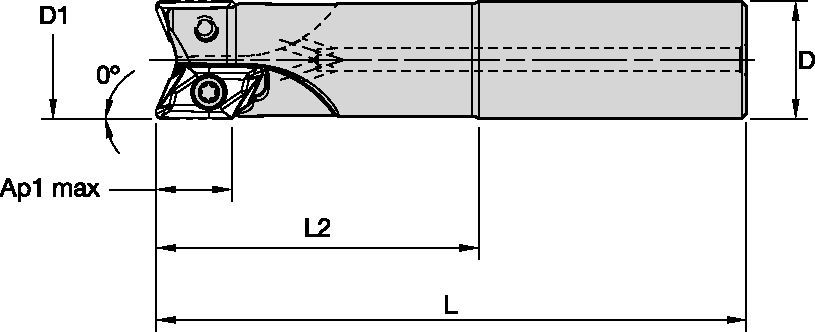
| Numéro de matériel | 5672718 |
| Ref. ISO Catalogue | C5720VZ16CA1.0Z2R2.75 |
| Ref. ANSI Catalogue | C5720VZ16CA1.0Z02R2.7 |
| [D1] Diamètre effectif de coupe | 25.4 mm |
| [D1] Diamètre effectif de coupe | 1 in |
| [D] Adaptateur / Queue / Diamètre d’alésage | 25.4 mm |
| [D] Adaptateur / Queue / Diamètre d’alésage | 1 in |
| [L] Longueur totale | 127.762 mm |
| [L] Longueur totale | 5.03 in |
| [L2] Longueur de tête | 69.85 mm |
| [L2] Longueur de tête | 2.75 in |
| [AP1MAX] 1re profondeur de coupe maximale | 16 mm |
| [AP1MAX] 1re profondeur de coupe maximale | .63 in |
| Nombre de plaquettes | 2 |
| Angle de ramping maximum | 14.7 |
| Poids Livres | 0.87 |
| T/Min max | 50000 |
Matériaux de pièce à usiner
- Fonte
- Non ferreux
Uses and application
Spiral Circular
Slotting: Shoulder Profiling
Surfaçage
Fraisage hélicoïdal
Ramping : Ébauche
Queue — Cylindrique Classique
Fraisage — Arrosage interne
Usinage de poches
Lamage
Inclined Square End Mill
Features and benefits
- For pocketing and profiling in aluminum and aluminum alloys.
- Maximum stability in high-speed applications.
- Excellent choice for components with thin walls due to low cutting pressure.
- Internal coolant supply.
- Reinforced pockets for high feed applications and ramping, increasing tool and productivity.
Créez une Solution pour calculer les avances et vitesses
Après avoir créé une Solution, choisissez simplement l'icône "Avances et Vitesses" et notre système vous fournira ses recommandations. Vous pouvez les personnaliser en ajoutant votre machine et vos spécifications techniques, ou en ajustant votre demande à l'aide des curseurs.
Guide de sélection des plaquettes
| 5720 Series • Insert Selection Guide | ||||||
| Groupe Matières | Travaux légers | Applications générales | Travaux lourds | |||
| – | (géomètrie légère) | – | (géomètrie solide) | |||
| – | résistance à l’usure |  | ténacité | |||
| – | Géométrie | Nuance | Géométrie | Nuance | Géométrie | Nuance |
| P1–P2 | – | – | – | – | – | – |
| P3–P4 | – | – | – | – | – | – |
| P5–P6 | – | – | – | – | – | – |
| M1–M2 | – | – | – | – | – | – |
| M3 | – | – | – | – | – | – |
| K1–K2 | – | – | – | – | – | – |
| K3 | – | – | – | – | – | – |
| N1–N2 | .F..721 | GH1 | .F..721 | GH1 | .F..721 | GH1 |
| N3 | .F..721 | GH1 | .F..721 | GH1 | .F..721 | GH1 |
| S1–S2 | – | – | – | – | – | – |
| S3 | – | – | – | – | – | – |
| S4 | – | – | – | – | – | – |
| H1 | – | – | – | – | – | – |
Feeds
Avances de départ recommandées [mm]
| 5720 Series • Recommended Starting Feeds [mm/th] | |||||||||||||||
| Géométrie de plaquette | Avance par dent de départ recommandée (Fz) en relation avec le % de l'Engagement Radial (ae) | ||||||||||||||
| 5% | 10% | 20% | 30% | 40–100% | |||||||||||
| L | M | H | L | M | H | L | M | H | L | M | H | L | M | H | |
| ...FR721 | 0,12 | 0.45 | 0.81 | 0,08 | 0.33 | 0.58 | 0,06 | 0.25 | 0.43 | 0,06 | 0.21 | 0.38 | 0,05 | 0.2 | 0.35 |
| ...ER721 | 0.15 | 0.50 | 0.92 | 0.11 | 0.36 | 0.66 | 0.08 | 0.27 | 0.5 | 0.07 | 0,24 | 0.43 | 0.07 | 0,22 | 0,40 |
| L = Light Machining; M = Medium Machining; H = Heavy Machining NOTE: Use "Light Machining" values as starting feed rate. | |||||||||||||||
| 5720 Series • Recommended Starting Feeds [IPT] | |||||||||||||||
| Géométrie de plaquette | Avance par dent de départ recommandée (Fz) en relation avec le % de l'Engagement Radial (ae) | ||||||||||||||
| 5% | 10% | 20% | 30% | 40–100% | |||||||||||
| L | M | H | L | M | H | L | M | H | L | M | H | L | M | H | |
| ...FR721 | 0,12 | 0.45 | 0.81 | 0,08 | 0.33 | 0.58 | 0,06 | 0.25 | 0.43 | 0,06 | 0.21 | 0.38 | 0,05 | 0.2 | 0.35 |
| ...ER721 | 0.15 | 0.50 | 0.92 | 0.11 | 0.36 | 0.66 | 0.08 | 0.27 | 0.5 | 0.07 | 0,24 | 0.43 | 0.07 | 0,22 | 0,40 |
| L = Light Machining; M = Medium Machining; H = Heavy Machining NOTE: Use "Light Machining" values as starting feed rate. | |||||||||||||||
Speeds
Vitesses de départ recommandées [m/mn]
| 5720 Series • Recommended Starting Speed [m/min] | ||||
| nuance | GH1 | |||
| Epaisseur copeau hm mm | Mini | Maxi | ||
| Groupe Matières | Maxi | Départ | Mini | |
| P | 1 | – | – | – |
| 2 | – | – | – | |
| 3 | – | – | – | |
| 4 | – | – | – | |
| 5 | – | – | – | |
| 6 | – | – | – | |
| M | 1 | – | – | – |
| 2 | – | – | – | |
| 3 | – | – | – | |
| K | 1 | 215 | 140 | 120 |
| 2 | 195 | 120 | 100 | |
| 3 | 180 | 105 | 80 | |
| N | 1 | 795 | 695 | 600 |
| 2 | 615 | 520 | 425 | |
| 3 | 615 | 520 | 425 | |
| S | 1 | – | – | – |
| 2 | – | – | – | |
| 3 | – | – | – | |
| 4 | – | – | – | |
| H | 1 | – | – | – |
| As the average chip thickness increases, speed should be decreased. Material groups P, M, K and H show recommended starting speeds for dry machining. For wet machining, reduce speed by 20%. Material groups N and S show recommended starting speeds for wet machining. Not recommended for dry machining. | ||||
| 5720 Series • Recommended Starting Speed [SFM] | ||||
| nuance | GH1 | |||
| Chip Thickness hex Inch | Mini | Maxi | ||
| Groupe Matières | Maxi | Départ | Mini | |
| P | 1 | – | – | – |
| 2 | – | – | – | |
| 3 | – | – | – | |
| 4 | – | – | – | |
| 5 | – | – | – | |
| 6 | – | – | – | |
| M | 1 | – | – | – |
| 2 | – | – | – | |
| 3 | – | – | – | |
| K | 1 | 705 | 460 | 395 |
| 2 | 640 | 395 | 330 | |
| 3 | 590 | 345 | 260 | |
| N | 1 | 2610 | 2280 | 1970 |
| 2 | 2020 | 1705 | 1395 | |
| 3 | 2020 | 1705 | 1395 | |
| S | 1 | – | – | – |
| 2 | – | – | – | |
| 3 | – | – | – | |
| 4 | – | – | – | |
| H | 1 | – | – | – |
| As the average chip thickness increases, speed should be decreased. Material groups P, M, K and H show recommended starting speeds for dry machining. For wet machining, reduce speed by 20%. Material groups N and S show recommended starting speeds for wet machining. Not recommended for dry machining. | ||||
CAD Drawings Models
Can’t find the file type you’re looking for?
Product data
I have read and accepted the Terms & Conditions of use
